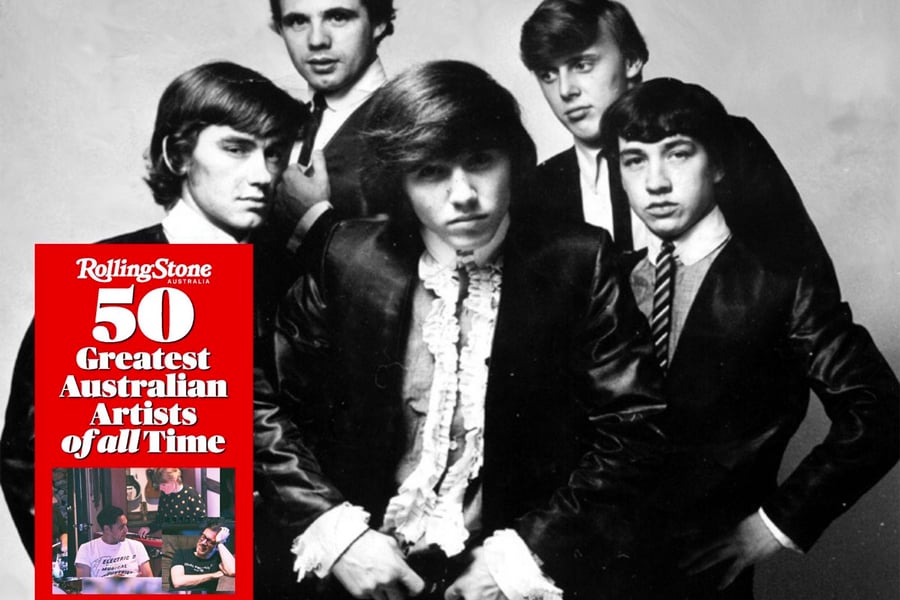In December of 2020, Rolling Stone Australia released a special edition issue which looks at the 50 Greatest Australian Artists of All Time, paying tribute to the best and most impactful artists in Australian music history. While it would have been easy for the editors and writers of the publication to profess their love of the listed artists, the decision was instead made for those who found themselves inspired by these world-renowned names to share their own testimonials of why these artists deserve to make the list.
In celebration of the issue’s release in December, we’re counting down the full 50 artists and their accompanying testimonials in this ongoing online feature. If you want to get your hands on an physical copy of the magazine, be sure to subscribe now to experience the double-length edition featuring some of Australia’s best and brightest discussing the finest names in local music.
50 Greatest Australian Artists of All Time – #11: The Easybeats (by Ben Birchall of Klinger and Slow Fades)
When you’re in a moderately successful local band, you play some…interesting shows. Sometimes they’re electrifying and in front of thousands. Sometimes they’re electric shocks from a dodgy PA in front of dozens. So when in the early Noughties, my band Klinger were added to a St Patrick’s Day lineup opening for erstwhile Easybeats frontman Stevie Wright, we were pretty dang chuffed.
As I packed up my guitar side of stage after our set of fizzy guitar pop, Stevie effing Wright was being helped on stage. He was frail but still had his pipes about him and rolled out the hits. It was sometime during “She’s So Fine” that something clicked (possibly the broken latch on my Jazzmaster case) and I felt I was part of the great tradition of Australian guitar music.
Music that you can trace back through Tim Rogers, through Deniz Tek, through Lobby Lloyde, and back to The Easybeats. I might have been coming at it from an ironic, indie, late Nineties Punters Club direction, but it was all triggered by those stuttering George Young chords that kick off “She’s So Fine”.
It’s easy to refract The Easybeats through the culture they influenced. Through the Nineties Big M ads they soundtracked or the Jimmy Barnes and INXS covers they sparked, or through what came later when George’s little brothers blew it all wide open, with George and Harry behind the desk. But sometimes you just have to go back to the source. Listen to the opening four bars of “Bring A Little Lovin’”. The Easybeats were a force.
The whipping guitar. Snowy’s drums, in turns pounding and skittery. The edge to Stevie’s voice. And Vanda and Young creating the template for hard rock guitars, before it was a GarageBand plug-in. Going back to the source can inspire you to unplug the synth plug-ins and just play some goddamn guitar. Preferably with someone wailing over the top, fizzing on diet pills. That’s the stuff. Pure and hard and why generations of Aussies have shouted into a pub microphone that smells like beer and Glen 20.
Love Music?
Get your daily dose of everything happening in Australian/New Zealand music and globally.
“Listen to the opening four bars of ‘Bring A Little Lovin”. The Easybeats were a force.”
It’s worth noting, I suppose, that the quintessential Australian guitar band comprised of exactly zero Australians. But hey, we’re a nation of (mostly) immigrants, and as a culture we benefit from what we import. Holland in the Sixties was a melting pot of guitar music, with US troops leaving R&B records behind and newly arrived Dutch-Indonesian kids electrifying Pacific guitar.
So it’s worth musing whether there would be any pub rock without Harry Vanda (nee Johannes Hendrikus Jacob van den Berg). Or musing what might have happened if he hadn’t met George Young at Villawood. Maybe we wouldn’t have had the first truly global Australian band, long before INXS, or Jet, or Courtney Barnett.
But wherever it came from, and wherever it was headed, on that St Patrick’s Day night on a patch of grass in Carlton, guitar music was alive and well. My guitar packed, I watched on from the side stage. Just for a moment, I was part of it.



































